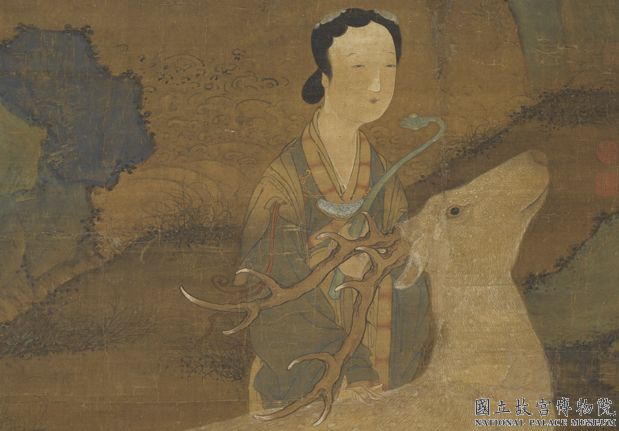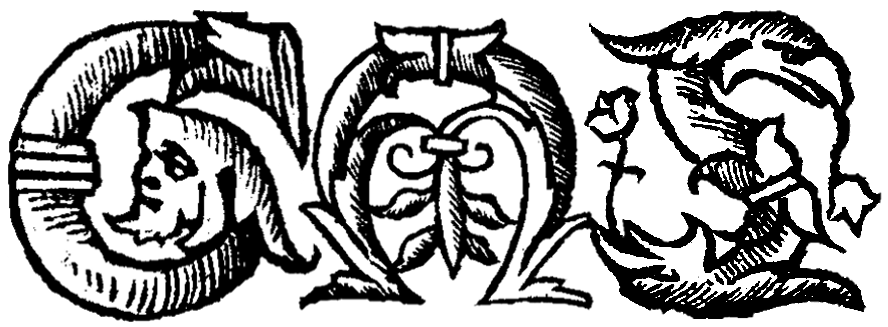To the tune “Song of the Immortal in the Grotto”—Skin of Ice and Bones of Jade | 洞仙歌 · 冰肌玉骨

“Detail from 宋人畫仙巖壽鹿軸 (goddess)”, Anonymous, National Palace Museum, Accession Number: K2A000165N000000000PAA [Public Domain]
Read the text (PDF)
Introduction to the Text
When Su Shi was seven years old, he heard a song to the tune “Song of the Immortal in the Grotto”, composed by the Lord of Shu, a ruler during the period of the Five Dynasties and Ten Kingdoms (907-960 CE). Forty years later, he could only vaguely recall the first two lines of the song and used his imagination to complete it himself. The lyrics describe the beauty of the Lord of Shu’s concubine following an amorous encounter at his palace in Sichuan Province, southwest China.
The ci genre of Chinese poetry first emerged in the Sui dynasty (581-619), was further developed in the Tang dynasty (618-907) and matured in the Northern Song dynasty (960-1127). Ci is usually translated into English as “song lyrics”. This is because ci were composed by poets to fit pre-existing tunes. The number of lines, the line lengths, and the tonal and rhythmic patterns of ci vary with the tunes, which number in the hundreds. One common occasion for composing ci would be a banquet: song lyrics would be scribbled down by guests and then sung by musical performers as entertainment. Other occasions for composing and enjoying ci would be more casual: the poet might sing the lyrics to himself at home or while travelling (many ci poets were civil servants of the Imperial Court and often had to travel great distances to carry out their work). Sometimes the lyrics would be sung by ordinary people in the same way as folk songs. This oral and musical quality sets it apart from other genres of poetry in China during the same period, which were largely written texts with more elevated objectives. There are two main types of ci : wǎnyuē (婉 约, “graceful”) and háofàng (豪放, “bold”). The wǎnyuē subgenre primarily focuses on emotion and many of its lyrics are about courtship and love, while the háofàng subgenre often deals with themes that were considered more profound by contemporary audiences, such as ageing and mortality, or the rewards and disappointments of public service.
Su Shi 蘇軾 is one of the most popular Chinese poets of all time, and certainly one of the best-known poets of the Song Dynasty. Among his many roles—principled politician, esteemed poet, celebrated calligrapher—he was also a major reformer of the ci genre. Before Su Shi, the primary form of ci was wǎnyuē (婉 约, “graceful”). This was considered to be an inferior form of literature due to its thematic focus on love and desire and its association with the courtesans who usually performed it. Su Shi wrote lyrics on a broad range of non-traditional topics, often closely related to his own life experience. His compositions dealt with themes that were considered more profound by contemporary audiences, such as ageing and mortality, or the rewards and disappointments of public service. As a pioneer of the háofàng (豪放, “bold”) type of ci, he incorporated references to typically masculine pursuits, including frequent use of a hunting motif. He also frequently incorporated ideas from Buddhist philosophy and allusions to political events, which usually appeared only in more elevated forms of poetry.
Although Su Shi was a highly-regarded poet during his lifetime, his political career was consistently unfortunate. In 1066, he was forced to leave the Court when he openly opposed the chancellor’s socio-economic reforms, known as the New Policies. Over the next thirteen years, he was frequently demoted, serving as prefect or sub-prefect in Hangzhou, Mizhou, Xuzhou and Huzhou. Many of his ci reference these postings and the exhaustion of constant travel. A report about the troubling economic conditions of local people written while he was prefect of Huzhou landed him in prison for three months. He was finally sent back to Hangzhou and given a job with no salary. Although living in poverty, he grew fond of Hangzhou and wrote many of his most famous ci there.
Because of the occurrence of specific real names and locations in Su Shi’s lyrics, as well as the introductory notes he wrote to accompany many of them, his lyrics often invite a biographical reading. This differentiates him from other ci poets featured in this collection, whose writings did not usually reference their own lives in such a direct way. Yet although Su Shi’s lyrics evoke specific lived experiences, the enduring popularity of his poetry is due, in part, to the fact that diverse audiences can identify with the feelings he describes.
About this Edition
The original text of this ci is based on the edition by Tang Guizhang 唐圭璋 ( Quan Song Ci 全宋詞, vol 1. Beijing: Zhonghua shu ju, 1965). Punctuation follows the edition. Since ci poetry rarely includes personal pronouns, and gender-differentiated pronouns did not exist in Classical Chinese of this period, the gender of the speaker as well as their perspective (e.g. first-, second- or third-person) must often be deduced by the translator from context.
Further Reading
Chang, Kang-i Sun. The Evolution of Tz’u Poetry: from Late Tang to Northern Sung. Princeton UP, 1980.
- A standard survey of the early history of Chinese song lyrics (romanized as both ci and tz’u).
Egan, Ronald. “The Song Lyric”. The Cambridge History of Chinese Literature, vol. 1, edited by Stephen Owen, Cambridge UP, 2010, pp. 434-452.
- An overview of the genre.
Owen, Stephen. Just a Song: Chinese Lyrics from the Eleventh and Early Twelfth Centuries. Asia Center, Harvard UP, 2019.
- A recent new history of the genre.
Tang, Guizhang 唐圭璋, editor. Quan Song Ci 全宋詞. Zhonghua shu ju, 1965. 5 vols.
- A comprehensive edition of ci from the Song dynasty and the source text for the ci in this collection (introductions and annotations are in Chinese).
To the tune “Song of the Immortal in the Grotto”—Skin of Ice and Bones of Jade | 洞仙歌 · 冰肌玉骨
洞仙歌
冰肌玉骨
余七歲時見眉山老尼姓朱
忘其名,
年九十餘
自言:
嘗隨其師入蜀主孟昶宮中
一日大熱,
蜀主與花蕊夫人夜起避暑摩訶池上
作一詞。
朱具能記之。
今四十年,
朱已死,
人無知此詞者。
但記其首兩句,
暇日尋味,
豈洞仙歌令乎,
乃為足之
冰肌玉骨,
自清涼無汗。
水殿風來暗香滿。
繡簾開、
5 一點明月窺人.
人未寢、
倚枕釵橫鬢亂。
起來攜素手,
庭戶無聲,
10 時見疏星度河漢。
試問夜如何,
夜已三更,
金波淡,
玉繩低轉。
15 但屈指、
西風幾時來,
又不道、
流年暗中偷換
To the tune “Song of the Immortal in the Grotto”
Skin of Ice and Bones of Jade
When I was seven, I once met an old nun from Meishan1 whose surname was Zhu,
but I have forgotten her given name.
She was more than ninety years old.
She said that
she used to accompany her master to the palace of Meng Chang, who is the Lord of Shu.
One day, there was a great heat.
The Lord of Shu and Lady Huarui2 got up at night to enjoy the cool air outdoors by the Maha Pond3.
He composed a song
and Zhu remembered the entire piece.
It has been forty years that Zhu has been dead;
No one else knows this song.
I can only remember the first couple of lines.
During my leisure time I savored it:
isn’t it to the tune of “Song of the Immortal in the Grotto”?
I have thus composed the rest of the piece to make up for the missing part.
Skin of ice and bones of jade4,
are naturally fresh and cool, with no sweat.
A light wind blows in the palace upon the water, infusing it with a subtle aroma.
The embroidered curtain is lifted:
5 a fraction of the bright moon light is used5 to peek at the beauty.
The beauty has not yet slept,
leaning on the pillow, with her hairpin laid aside and the hair at her temples unkempt.
She gets out of bed and I hold her fair hands;
the courtyard is silent.
10 From time to time, scattered stars are seen crossing the Milky Way.
She asks: what time of night is it?
It is already midnight.
The golden wave6 of moonlight is fading;
the Jade Rope7 descends.
15 She counts on her fingers:
when will the west wind8 come?
Without noticing,
the fleeting years are secretly stolen away.
Critical Notes
-
Meishan was Su Shi’s hometown, in present-day Sichuan Province.
-
Lady Huarui 花蕊夫人 was the Lord of Shu’s favorite concubine and a poet in her own right. “Lady Huarui” was not her birth name, but rather given to her by the Lord of Shu after her appearance was compared to the pistil of a flower (“huarui” is the Chinese word for pistil).
-
“Maha” means great in Sanskrit. Situated in Sichuan, “Maha Pond” is a large pond in the palace of the Lord of Shu.
-
This is a phrase used to describe the beauty of women’s bodies, clean like ice and smooth like jade. It comes from a philosophical work by Zhuangzi, in which he uses “skin of ice and bones of jade” to describe a deity living in the Gu Ye Mountain. The phrase suggests a somewhat otherworldly beauty.
-
By the Lord of Shu.
-
Here the “golden wave” refers to the moonlight.
-
“The Jade Rope” is the name of the two stars to the north of the fifth star of the Dipper. In autumn, when the Jade Rope moves to the northwest and slowly descends, it is usually close to daybreak.
-
Western wind is an image with multiple meanings in Chinese poetry. Here it is most likely used to endow the line with a melancholic tone.
